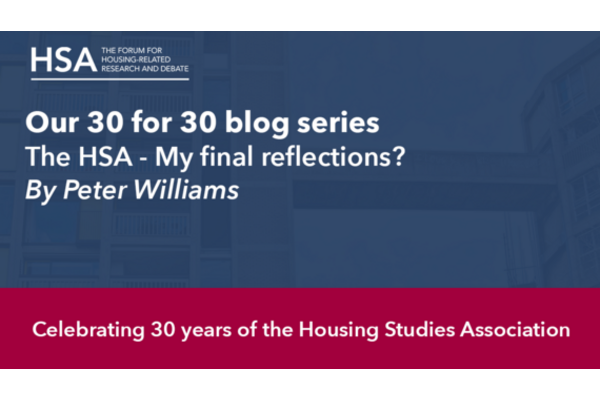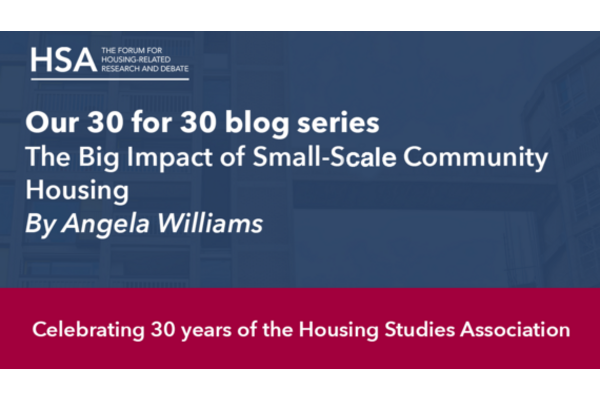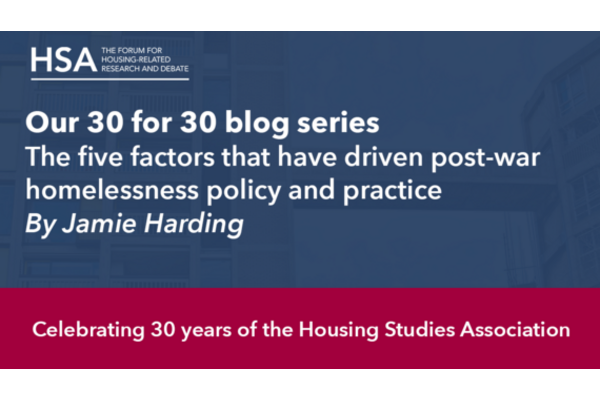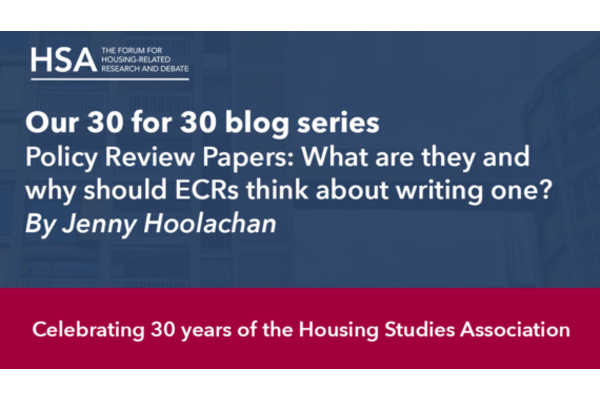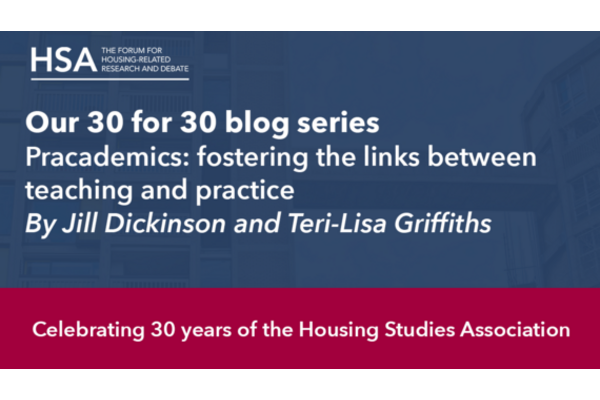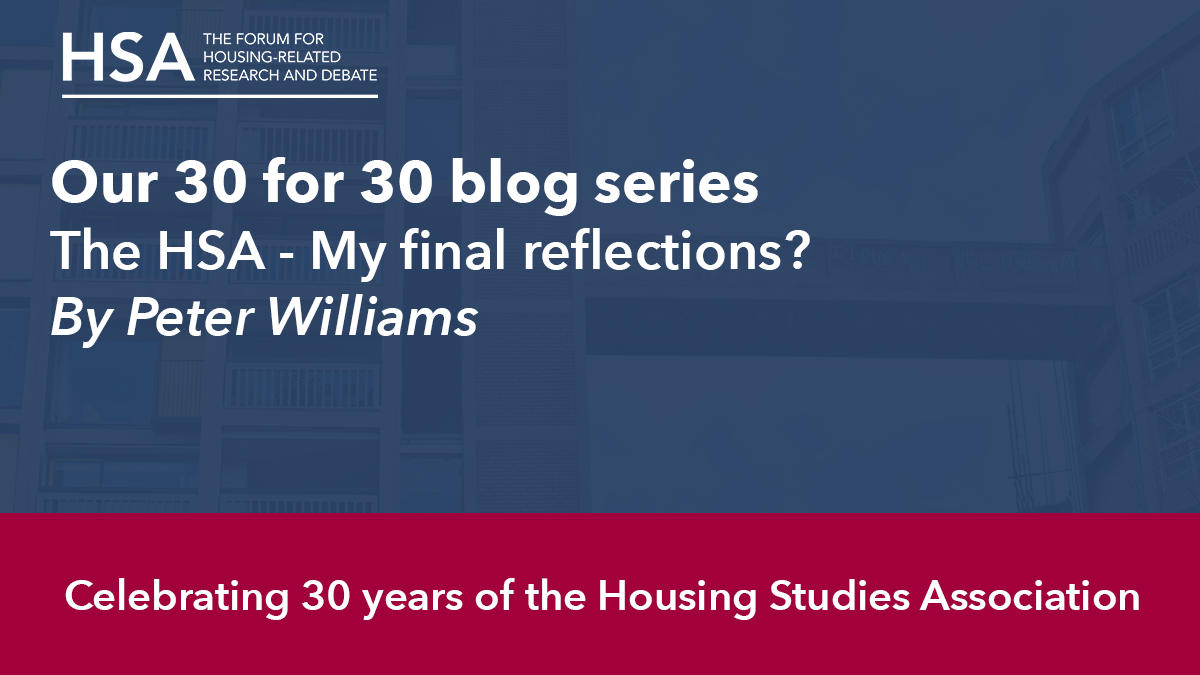
The HSA – My Final Reflection?
I am delighted to join in celebrating the 30th year of the HSA. When I wrote a short piece in the Newsletter in spring 2001 celebrating ten years I was hoping the association would continue well into the future and so it seems my wish has been granted.
The names may have changed as indeed has the landscape of housing research and research centres but the purpose and relevance remains the same such is the enduring nature of the housing question. The bedrock of an enthusiastic and engaged membership and the continued supply of people willing to step up and help run the organization are of course the key ingredients.
The last 18 months have been demanding of anyone trying to run such bodies (or indeed teach and research) so we owe a huge debt of thanks to the committee for keeping the ship afloat and indeed organizing the conference. Hopefully some of the pressures may be easing and a degree of normality - whatever that is - may be restored but no doubt challenges will remain.
What is striking is how the focus of housing research has changed over the years, in part a consequence of the changing policy landscape and housing issues. Homelessness and the wide spectrum of agendas around it has become notably more significant (though it prompts me to pull down from the shelf a copy of our Cardiff report Study of Homeless Applicants published by HMSO in 1996). Social housing remains an enduring theme but the PRS has also become a bigger focus – there were some, me included, that in the 1980s thought the PRS might shrink to virtually nothing. Theory too has rightfully become more important and more explicit not least as housing research has embedded itself more fully in social science in general.
Topics such as area improvement and renewal are less common today but with Grenfell, the cladding scandals and levelling up (in which housing is central) we can expect to see these agendas strengthen. The housing market, housing finance/economics, housing policy and indeed comparative housing are perhaps less apparent at present, possibly reflecting the run-down of government housing research programmes, the rise of devolution and the fragmentation of the UK housing agenda. Land ownership and the land market continue to be neglected topics though planning research reflecting the constant attempts at “reform” has expanded along with a new interest in the built form and sustainable communities.
To me what is disappointing is the loss of shared knowledge and data from across the UK despite the fact that the 4 countries provide a fantastic “compare and contrast” framework for housing research and policy formulation.
Without doubt the strength of the academic housing research community in Scotland alongside devolution has helped ensure research is more deeply embedded in policy formulation in that country than elsewhere. Of the other three countries Northern Ireland perhaps has done best albeit relying on a small number of individuals, Wales has a frustratingly on/off relationship with research and policy and England is a shadow of its former self despite its scale. With HM Treasury dominating housing policy formulation and a real focus on short term initiatives research has played a limited role.
Partly reflecting the vacuum we have seen a number of new entrants to the scene not least with housing associations becoming important funders of what are typically one off studies or building their own research capacity - which in turn helps build career opportunities outside of academia. Inevitably such research must reflect corporate objectives and this can be limiting. Housing has also made its way quite strongly onto the agendas of think tanks and other bodies who are typically rather good at generating headlines and coverage.
Over the 30 years we have seen the rise and fall of agendas, funding and institutions. Looking back centres such as Bristol and Birmingham no longer have the dominance they once enjoyed. The CaCHE network now in its last year of the 5 year ESRC and others funding is centred on Glasgow and Sheffield albeit drawing in an array of others institutions and it would be interesting to compare numbers of housing researchers across the UK and by country now and say in 1991.
We can only hope that further funding emerges for the housing research community. The locations may change but perhaps like puppies, it should be recognised that housing research is not just for Christmas! As is evident from the work going on at present and previously, housing is a very complex issue intertwined with so many other factors and with a very variable geography. It is subject to constant change as the circumstances of households and economies ebb and flow. It stands front and centre in people’s lives
The HSA provides a key platform for exchange and debate around an ever more fragmented agenda and perhaps an ever more dispersed research community. Finding ways forward remains challenging. Funding, careers, agendas are all live issues. At the same time we must avoid becoming entrapped in a housing silo while at the same time recognizing the depth and complexity of the housing domain.
I began my housing research career in 1972. Some 49 years on there is no sign that we have exhausted either the need for work or the agenda. Indeed I am tempted to close by saying the housing situation we are all working on and thinking about is worse now than it has ever been.
Peter Williams, Departmental Fellow, University of Cambridge
Peter Williams has been a writer and researcher for nearly 50 years. He has both co-authored and edited a number of books and articles and continues to publish mainly on topics related to housing and mortgage markets. He was previously Director of the Cambridge Centre for Housing and Planning Research, Deputy Director General of the Council of Mortgage Lenders and Professor of Housing at the University of Wales, Cardiff. He has served on numerous government bodies and reviews in England and Wales.

